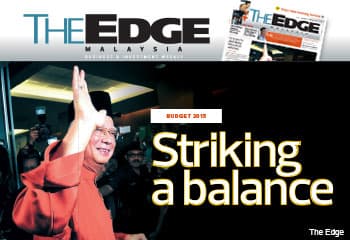
KUALA LUMPUR (Oct 11): Budget 2015 is a juggling act aiming for fiscal prudence and economic growth while looking out for the needs of the rakyat especially those in the lower income group.
It is a balance between the capital economy (economic management and policies from the macro perspective) and people’s economy (covering the priorities and interests of the rakyat), said Prime Minister Datuk Seri Najib Razak when tabling the budget in Parliament on Friday.
It has enough “goodies” to be rakyat-centric including higher cash handouts under Bantuan Rakyat 1Malaysia (BR1M)s, a 1%-3% reduction in personal income tax and a restructuring of the current tax band which will spare some 300,000 individuals from paying the tax. It will make housing more affordable to more people, as well.
(Please see Budget 2015 at a glance)
On top of these are a slew of other initiatives meant to maintain economic growth at 5%-6 %, as the government revs up its subsidy rationalisation while easing in the Goods and Services Tax (GST).
As Deloitte Malaysia country tax leader Yee Wing Peng sees it, Budget 2015 is about the successful implementation of the Goods and Services Tax (GST) and winning the rakyat’s buy-in on the subsidy rationalisation plans.
Yee is among a number of analysts, academicians, politicians and other observers who shared their views on the budget in The Malaysia Edge Weekly (Oct 13- 20) out today (Saturday).
KPMG Malaysia tax Chief Operating Officer Nicholas Crist concurs with Yee. Crist says Budget 2015 is straightforward, with emphasis on ensuring the GST is implemented successfully.
“The prime minister wants to keep it simple so that people are not distracted from the upcoming GST implementation,” he adds.
Deloitte’s Yee also draws attention to the expanded GST-exempt list which will benefit consumers, not just the poor but also the middle-income group (which often complains of being overlooked) and the rich.
He says the inclusion of 2,900 medicine brands in the list is a surprise, with the proposal indicating that those bought over the counter or at pharmacies will be GST-free as well.
EY Malaysia partner and tax leader Yeo Eng Ping notes the special relief given to RON95, LPG (liquefied petroleum gas) and diesel, in that no GST will be levied at the petrol stations.
Yeo says the special relief order is different from the zero-rating list, although in practice the result should be the same.
Perhaps, this will allow flexibility in amending the position in the future, if required, she says.
Experts say being a consumption tax, the GST taxes those who are consuming more goods and services and they are likely to be those in the higher-income brackets.
The fact that basic services (public transport and education) and food items such as rice, sugar, flour, cooking oil, vegetable, eggs, fruits, noodles, coffee powder and bread are not subject to GST also helps alleviates the burden of the lower-income group.
Despite these cushions, GST will be “net negative” for the consumer and largely “revenueneutral” for the government in 2015, CitiResearch economist Kit Wei Zheng wrote in a note following the tabling of Budget 2015.
Expecting only a moderate growth in domestic consumption, AllianceDBS Research economist Manokaran Mottain expects Malaysia’s economy to grow at only 5.2% in 2015, nearer the lower end of the government’s official forecast.
Some economists point out that the government’s overall subsidy bill is projected to decrease only RM2.9 billion next year.
While Citi’s Kit reckons that the government’s seemingly “gradual” stance in cutting subsidies “dilutes savings” that would improve its fiscal position, the average consumer would likely welcome a softer landing on the eventual subsidy rationalisation.
Meanwhile, Jeff Ng, Standard Chartered Bank’s economist in Singapore, says, the budget is in line with expectations, noting a lot of initiatives for infrastructural development which could promote growth and pave the way for the economy to expand, an element important to achieving a balanced budget by 2020.
Meanwhile, DAP National Publicity Secretary Tony Pua has expressed disappointment over Budget 2015, claiming the prime minister did not address the pertinent issues relating to federal government debt.
Pua points out that federal government debt is close toRM570 billion as of June 2014.
“All the debts that the government has racked up, through the state agencies, were during Najib’s administration over the last five years, particularly 1MDB (1Malaysia Development Bhd),” he told reporters after the Budget speech, citing that 1MDB alone had accumulated RM36 billion in debt during the period.
“We want to know how that is going to be dealt with, to ensure that the country’s financial system is not going to beat risk,” he said.
Similarly, Member of Parliament for Kelana JayaWong Chen (PKR), questions the need to allocate RM22 billion to the Prime Minister’s Office, or 8% of Budget 2015’s total allocation of RM273.9 billion.
For comparison, Wong says the armed forces gets amere RM17 billion, the Health Department, RM24 billion, and the home office, RM13 billion.
“That means the prime minister controls about 8% of the national budget and his office does not d do anything in particular,” said Wong.
“It does not run hospitals or schools. It does not run the police or army. So why the massive budget [allocation]?” he asked.
Meanwhile, in the column “My Say”, The Edge Media Group Managing Editor Anna Taing says hand-outs such as Brim, can only be a short-term measure to address the economic hardship of the people when prices rise.
“For sure, safety nets for the poor are needed but they should not go on indefinitely. This is where a timeline to phase out such assistance would have made the government’s policies clearer, “she says.
 |
Save by subscribing to us for your print and/or digital copy.
P/S: The Edge is also available on Apple's AppStore and Androids' Google Play.